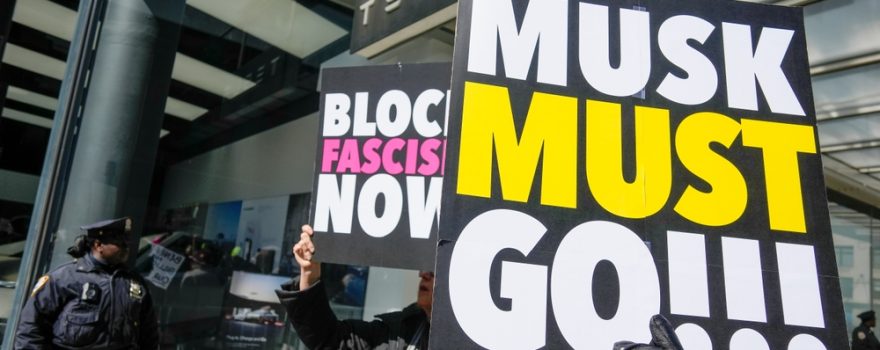
Tesla showrooms, dealerships, and charging stations worldwide have become the focal points of a major protest today, as the ‘Tesla Takedown’ movement calls for economic resistance against Elon Musk’s influence on government policies. Organizers have urged Tesla owners to sell their vehicles and stocks, hoping to impact Musk’s financial power and his role in reducing public funding for social programs.
However, the peaceful demonstrations have been overshadowed by a rising wave of political and legal backlash. While most protesters remain nonviolent, isolated incidents of vandalism and arson have ignited a debate that increasingly conflates activism with extremism.
Former President Donald Trump has condemned attacks on Tesla properties as “domestic terrorism” and vowed to imprison “terrorist thugs.” U.S. Attorney General Pam Bondi has pledged to investigate the financiers and organizers of the protests, despite evidence indicating that violent incidents were isolated actions by lone offenders. Musk himself has further escalated tensions by accusing some protesters of “committing crimes” on social media.
The aggressive rhetoric has raised fears that peaceful demonstrators may face extreme legal consequences. Mike German, a former FBI special agent, warned that counterterrorism tactics are frequently misused against civil rights movements. “Corporate interests often reframe public dissent as a law enforcement issue rather than a legitimate social concern,” he told TechCrunch.
Tesla Takedown organizers continue to emphasize nonviolence. Their primary objective is not physical destruction but financial pressure, encouraging consumers and investors to withdraw support from Tesla.
“Musk’s power stems from his wealth,” said Natasha Purdum, a New Jersey-based organizer. “If we impact Tesla’s stock, we strike at the core of his influence.”
Musk remains financially dominant. With a 13% stake in Tesla valued at approximately $107.8 billion, he maintains immense economic and political sway. His $44 billion acquisition of Twitter and a $260 million donation to Trump’s America PAC further illustrate his role in shaping public discourse.
Law enforcement has intensified its surveillance of Tesla Takedown events. The FBI has activated terrorism task forces to monitor protests, while local police have dispatched counterterrorism units. An NYPD officer at a Manhattan protest confirmed their presence was to prevent potential acts of arson.
Musk and his allies have escalated their rhetoric ahead of the March 29 global demonstrations. On Fox News, Musk vowed to “go after those spreading lies and propaganda.” Trump has suggested that progressive groups like ActBlue may be funding the movement, though no concrete evidence has been provided.
This effort to portray peaceful activists as extremists follows a well-documented pattern of protest suppression. “Authoritarian regimes have always sought to silence dissent by equating it with violence,” said Stephanie Frizzell, a Dallas-based Tesla Takedown organizer. “But we will not be intimidated. Free speech is the foundation of democracy.”
As tensions mount, protesters are advised to remain vigilant. Organizers encourage demonstrators to follow local laws, avoid trespassing, and keep legal support readily available.
The battle between corporate power, political influence, and the right to protest is unfolding in real time. Whether Tesla Takedown can sustain its momentum against mounting resistance remains to be seen.

 Get in Touch
Get in Touch 


